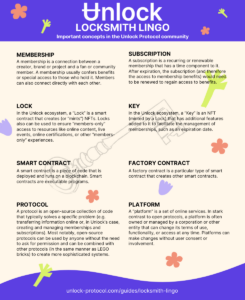Unlock Labs has an “I’m Going!” commitment feature in the EVENTS by Unlock Labs onchain ticketing platform. Designed for organizers who are organizing free events, this feature can greatly increase attendance and reduce no-shows.
Here’s how it works: Attendees stake a small amount of money when RSVPing for a free event, which they get as a “kickback†” if they attend. On the other hand, no-shows forfeit their commitment payment.
The “I’m Going!” commitment feature is the kind of capability that is only available onchain, and only available with EVENTS by Unlock Labs.
This feature helps conference organizers reduce no-show rates, ensuring better attendance from those who have claimed tickets. By reducing no-shows, organizers can better plan for venue size, seating, catering, and materials, ensuring they are setting up their event and venue for an appropriate number of projected attendees.
Attendees also benefit. Attendees benefit by securing their spot at popular events and receiving their money back when they attend, which can enhance their commitment (as well as ensure they don’t miss out on valuable sessions or events).
The forfeited funds from no-shows can be used in a number of ways. They can be used to cover costs associated with the event, enable organizers to improve the event experience, offer better amenities or, in the future, even be shared with the attendees who did attend.
Setting up the “I’m Going!” feature for a free event
Set up your event as you normally would from https://events.unlock-protocol.com. Be sure to set a nominal price for the event, and check the I’m Going! / “Treat the price as a deposit” checkbox during the setup.
Note: The I’m Going! feature currently is not applicable to credit card purchases. Attendees must pay/stake using an onchain wallet to receive their refund after checkin.
Once the event is created, a landing page is automatically set up for the event.

Attendees can register and commit their stake for the event from the landing page, and are notified on the landing page that they will be refunded if they attend the event.
Attendees will receive their ticket after checking out and staking their deposit as shown above.
Checking in attendees
When attendees show up for the event with their ticket, organizers verify the tickets and check them in at the door. Checking an attendee in at the door adds the attendee to the list of individuals who can claim their refund for attending.
You can see more details on the check-in process here.
Approving refunds for checked-in attendees
To start the refund process for checked-in attendees, organizers need to approve the refund smart contract to perform the refund, and then update the list of checked-in attendees who will receive the refund.
Organizers go to Settings > Verifiers in their event management page to start the refund process. Approve the refund contract to refund the funds, and update the list of checked-in attendees.

Attendees claiming their commitment
After the event has concluded (for example, the next day), attendees who checked in at the event and who are on the list created in the previous step can return to the event landing page and claim their refund.

The “I’m Going!” feature marks a significant advancement in onchain event management, offering a way to reduce no-shows and increase attendance at free events.
By requiring attendees to stake a small amount of money when RSVPing, which they get back upon attending, the feature drives commitment and attendance, and enables organizers to better plan their event experiences.
The “I’m Going!” feature is currently in beta, with further refinements and general availability later in the summer. Want to try it out? Head over to https://events.unlock-protocol.com and create your event, and don’t hesitate to reach out to the Unlock Protocol community Discord if you have any questions!
† The “I’m Going!” feature was inspired by the work of Makoto Inoue and the team that worked on Kickback, which was sunset in 2023. The Unlock Labs team builds on the Kickback vision and is an example of how bringing activities onchain inspires and enables new primitives that are otherwise impossible or infeasible. We are greatly appreciative to the pioneering work that was done by Makoto and the Kickback team and community, and are honored to move it forward.





